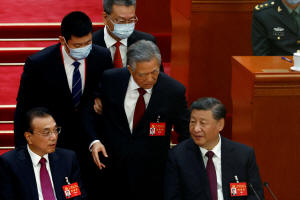Hu's dramatic China congress exit fuels speculation, official silence
 Send a link to a friend
Send a link to a friend
 [October 24, 2022]
By Martin Quin Pollard [October 24, 2022]
By Martin Quin Pollard
BEIJING (Reuters) - In a country where
events are planned to minute detail and politics is cloaked in secrecy,
former President Hu Jintao's dramatic escorted exit from the closing of
the Communist Party Congress sent speculation among China-watchers into
overdrive.
As per tradition, Hu, 79, had been seated on Saturday to the left of his
successor, Xi Jinping, who was in the process of securing a third
leadership term that was confirmed on Sunday.
During the once-in-five-years congress, Xi solidified his grip on power
by appointing a Standing Committee made up entirely of loyalists - and
excluding the three most senior members of Hu's once-powerful Communist
Youth League faction.
The timing and circumstances have thus led to fevered conjecture over
exactly what happened and why: was it a "senior moment" for a man who
appeared unsteady when he was helped onto the same stage a week earlier?
Or something more sinister: a protest by Hu? A purge by Xi?
Numerous commentators said the symbolism, at least, spoke to the demise
under Xi's increasingly authoritarian rule of the Youth League and
China's tradition of collective leadership.
"It looked like an era has gone," said Joerg Wuttke, president of the
European Union Chamber of Commerce in China, who has lived in Beijing
for decades. "It looked, frankly, very weird."

Photos and videos of the incident showed Hu reaching for a red folder on
the desk in front of him, being held back by China's top legislator Li
Zhanshu, and soon thereafter being led off the stage of the main
auditorium of the Great Hall of the People in Beijing by two stewards.
At one point, Li appeared to try to assist him, but was held back by
Wang Huning, another member of the Politburo Standing Committee. Hu
appeared to be distressed, and to resist being escorted from the stage.
He exchanged words with Xi and patted the shoulder of his Youth League
protege, the outgoing Premier Li Keqiang, as he was escorted away.
"I was actually quite stunned about the fact that the whole group of
people didn't show any empathy for an old man clearly struggling,"
Wuttke said.
[to top of second column]
|

Former Chinese president Hu Jintao
leaves his seat next to Chinese President Xi Jinping and Premier Li
Keqiang, during the closing ceremony of the 20th National Congress
of the Communist Party of China, at the Great Hall of the People in
Beijing, China October 22, 2022. REUTERS/Tingshu Wang/File Photo

'FEELING UNWELL'
China's only comment came in a pair of tweets in English late on
Saturday by its official Xinhua news agency saying that Hu had been
feeling unwell, an explanation that has been met with scepticism by
some China-watchers.
Twitter is blocked in China, and there has been no mention of the
incident in domestic media.
State TV's Saturday night news broadcasts included images of Hu at
the congress, before his exit.
Asked at a regular news conference on Monday about the incident and
the global attention it has gained, China's foreign ministry
referred to the Xinhua tweets.
China's State Council Information Office did not immediately respond
to a Reuters request for comment.
"This episode probably tells us much more about China's information
environment than it does about any power struggles within elite
Chinese politics," said Benjamin Herscovitch, a research fellow at
the Australian National University.
Chinese politics, always opaque, have become even more secretive
under Xi's decade-long tenure.
"Despite the plausibility of a mundane explanation of ill-health,
the CCP's secretiveness vis-à-vis senior Chinese leaders and elite
Chinese politics lends itself to many more salacious explanations,"
he said.
On China's Twitter-like Weibo, a few social media users alluded to
the incident by commenting on old posts featuring Hu. By Saturday
night, the comments sections of almost all Weibo posts with Hu's
name were no longer visible.
"I don't know what happened," said Victor Shih, associate professor
at the University of California, San Diego. "Obviously, the timing
is a bit suspicious."
(Reporting by Martin Quin Pollard; Editing by Tony Munroe and Alex
Richardson)
[© 2022 Thomson Reuters. All rights
reserved.]
This material may not be published,
broadcast, rewritten or redistributed.
Thompson Reuters is solely responsible for this content. |